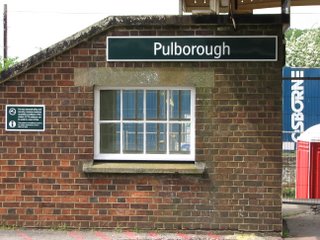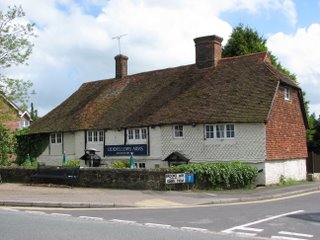European Roots, Part 2: The English
The last place that I have to mention in my Genealogical travel itinerary is the origin of the Freemans. Rather than re-inventing the wheel, here a really good entry on the first Freeman to come to North America.
Edmund Freeman Jr came from Pulborough, County Sussex, England in the 'Abigail' in 1635 with his wife and four children. They settled at Saugus, Mass., moved to Duxbury, Mass. in 1637 . He was a freeman in 1637, was leader of the ten to settle Sandwich, Mass. in 1639, and received the largest land grant there. He was deputy at PlymouthColony in 1641, assistant to Gov. Bradford from 1645 to 1647, member of the Council of War in 1642, presiding officer of a court of three'To hear and determine controversies and cawses' and was later selected judge.
He, with his four children, in company with several other individuals of the same family name, whose relationship is not yet established. engaged passage for New England on the "Abigail," Robert Hackwell, Master, early in July, 1635, and arrived in October following. It is said that "he was a man of consideration in England and brought with him much valuable plate". He settled first at Lynn, in Massachusetts Bay Colony, for a short time. During his residence there he presented to the Colony twenty corslets or suits of plate armor. These he doubtless brought over in view of the Indian Menace. For some reason ! he and others of Lynn wished to remove to Cape Cod and asked Plymouth Colony for a grant of land there. On April 3, 1637, it was ordered "that these ten men of Saugus" {Lynn}, including EDMOND , " shall have liberty to view a place to sitt downe & haue sufficients lands for three score famylies ...." The present location of Sandwich was chosen and a number of men, many of whom had families, removed there from Lynn in, or perhaps even before, 1637. Certain conditions were to be met before an absolute deed would be given to them by the Colony and in 1847 this document was mads out to EDMOND as agent, who in turn devised the lands to the town and to its various proprietors on their repaymant to him of money invested and their promise to complete the requirements, the matter not being closed
until 1651. As a consequence of this agency he is called :the original proprietor of Sandwich."
Some of the Freemans left Massachusetts for Nova Scotia about one hundred years later in the wake of the American revolution. My family descended from these Freemans who operated mainly as millers on the South Shore of Nova Scotia. When Greenfield was founded in 1830, my great great great grandfather Gorham Freeman built a mill there. The present mill owned by the family is the latest in a long line of mills for grinding grain, making shingles and sawing lumber. My Grandfather likes to chant this poem to any willing audience:
The Freeman boys the built a mill
most of the time it did stand still
but when it went, it made no noise
Cause it was made by freeman boys.
I'll have to ask him where he got that one from.
So all of that was a bit unnecessary as I won't be going to Sandwich, Massachusetts on this trip. I did, however, go to Pulborough, England.

Only a short train ride from London, Pulborough is in the rolling hills of West Sussex county. I got off the train in the middle of the afternoon and headed to the nearby fish and chips take away. I got the biggest piece of fish I have ever seen, and some chips wrapped up in paper. The shop owner sent me down the road toward the centre of town which he said was a mile away.
I was looking for a spot to eat the fish and ships when it started to rain. The heavy wind blew the wetness right through me so that I had to search for a sheltered road to walk along. A public walkway led me through a field to a public bridle path leading through small homes. There were trees and bushes on one side which sheltered me a bit form the prevailing winds. I tried to rest in a few places to eat my fish and chips but found it impossible to dig in with rain dripping on me.
The shelter of the trees eventually ended, laving me to open full force of the wind and rain that was less than it had been. One thing that stuck me as odd was that all the detached houses, no mater how small, had a name. I didn't jot any down (it was raining), but they were names like Stonewood or Thistlehollow and one that I did remeber was oriental in design and called Green Jade with the Chinese characters above the English.
At the end of the road expose to the weather I found shelter in a phone booth and ate my fish. I also enjoyed a can of cream soda which reminded me of having ice cream floats at my grandparents as a kid.


When I got outof the booth the rain was almost gone and I headed out of th eother side of town thinking I had seen it all. I went down another public walking path, which seemed to be everywhere. This one lef through soem fields and a muky holow near a swamp. I stopped at a garden centre and a pub for a pint before realizing that I had made a huge detour around the centre of town.

Back into town, I saw the main street and a few buildings that would have been aroudn when Edmund Freeman, and Edmund Freeman Jr. lived there. Visits to the two small buchers turend out to be fruitless as everytrhing was raw and needed to be cooked. I managed to find some noticably old postcards which I sent home after wrting in the library. The town was cute and I was happy to speak with a few locals at shops and the library. With my accent they gave me a freidnlz searching look, while I could sense in their head the questiosn of "what is he doing here?".

Heading back to the station, I stopped by the local perish. I think I brished my hand agains poison Ivy along the way, leaving me with an itchy knuckle for a day and a half. I read a gravestone for someone dead in the 1750s but this was almost unlegable. Edmund Freeman senior was probably burred there in 1623, but there was no way I could have found his grave. It would have been unreadable.




Just by the station, I stopped by the old country bridge that would have served the road from London further southwest to Chitchester. In the station there were teenaged locals playfighting and running around being stupid. At home this would have been annoying, but with local Sussex county accents which were a bit hickish, it was fun to watch. I sat on the platform a bit wet and tired, but I felt accomplished for having finished tracking down the places where my ancestors left Europe from.



1 Comments:
We also visited London on a couple occasions. Saw the Crown Jewels and all that sort of stuff in the Tower of London. Also took in the "changing of the guard." We journeyed down to Plymouth and looked up some info on the Freeman line. i should have given you some information on your Great Grandmother Slauenwhite. She was an English girl so you would have numereous cousins near London.
Grammie
Post a Comment
<< Home